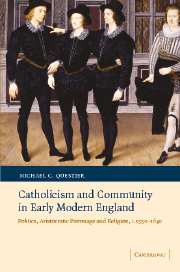 Catholicism and Community in Early Modern England
Catholicism and Community in Early Modern England Book contents
- Frontmatter
- Contents
- List of illustrations
- Preface
- Note on the text
- List of abbreviations
- 1 Introduction
- 2 The local setting
- 3 The emergence of a Catholic dynasty: the Brownes of Cowdray
- 4 The Brownes, Catholicism and politics until the Ridolfi plot
- 5 The Brownes, Catholicism and politics from the 1570s until the early 1590s
- 6 The entourage of the first Viscount Montague
- 7 A period of transition
- 8 The 1590s to the Gunpowder plot
- 9 Catholic politics and clerical culture after the accession of James Stuart
- 10 The household and circle of the second Viscount Montague
- 11 ‘Grand captain’ or ‘little lord’: the second Viscount Montague as Catholic leader
- 12 The later Jacobean and early Caroline period
- 13 The second Viscount Montague, his entourage and the approbation controversy
- 14 Catholicism, clientage networks and the debates of the 1630s
- 15 Epilogue: the civil war and after
- Appendix 1 The Brownes in town and country
- Appendix 2 The families of Browne, Dormer, Gage and Arundell
- Index
- Titles in the series
5 - The Brownes, Catholicism and politics from the 1570s until the early 1590s
Published online by Cambridge University Press: 06 July 2010
- Frontmatter
- Contents
- List of illustrations
- Preface
- Note on the text
- List of abbreviations
- 1 Introduction
- 2 The local setting
- 3 The emergence of a Catholic dynasty: the Brownes of Cowdray
- 4 The Brownes, Catholicism and politics until the Ridolfi plot
- 5 The Brownes, Catholicism and politics from the 1570s until the early 1590s
- 6 The entourage of the first Viscount Montague
- 7 A period of transition
- 8 The 1590s to the Gunpowder plot
- 9 Catholic politics and clerical culture after the accession of James Stuart
- 10 The household and circle of the second Viscount Montague
- 11 ‘Grand captain’ or ‘little lord’: the second Viscount Montague as Catholic leader
- 12 The later Jacobean and early Caroline period
- 13 The second Viscount Montague, his entourage and the approbation controversy
- 14 Catholicism, clientage networks and the debates of the 1630s
- 15 Epilogue: the civil war and after
- Appendix 1 The Brownes in town and country
- Appendix 2 The families of Browne, Dormer, Gage and Arundell
- Index
- Titles in the series
Summary
After the trauma of the 1569 rebellion, Montague may have hoped to limit the reaction against his co-religionists. In early April 1571 he was present in parliament at a conference between the two Houses on a bill concerning religion. The bill enforced attendance at church more strictly and, crucially, compelled reception of communion. In April and May he was nominated to sit on a committee with, among others, the earls of Huntingdon and Bedford to consider the bill which became ‘An Acte agaynst Fugytyves over the Sea’, and also, in May, the treasons bill which became ‘An Acte whereby certayne Offences bee made Treason’.
In some ways it is curious that Montague should have been charged with overseeing a bill which enforced full ecclesiastical conformity, though he was himself a conformist and, in any case, the bill failed because Elizabeth vetoed it. Perhaps Montague intervened in order to stymie the passage of this legislation. There are vague ambassadorial reports which suggest that some of the peers objected to provisions in the bill which intruded on noble privilege in this respect (although there is no direct indication that Montague was among them). When the bill received its third reading in the Lords, four Catholic peers (Worcester, Southampton, Windsor and Vaux) voted against it, but Montague did not. In fact, on this occasion, he was not present in the House at all. (This is one of the very few days in this session in which he was noted as being absent.
- Type
- Chapter
- Information
- Catholicism and Community in Early Modern EnglandPolitics, Aristocratic Patronage and Religion, c.1550–1640, pp. 150 - 180Publisher: Cambridge University PressPrint publication year: 2006


